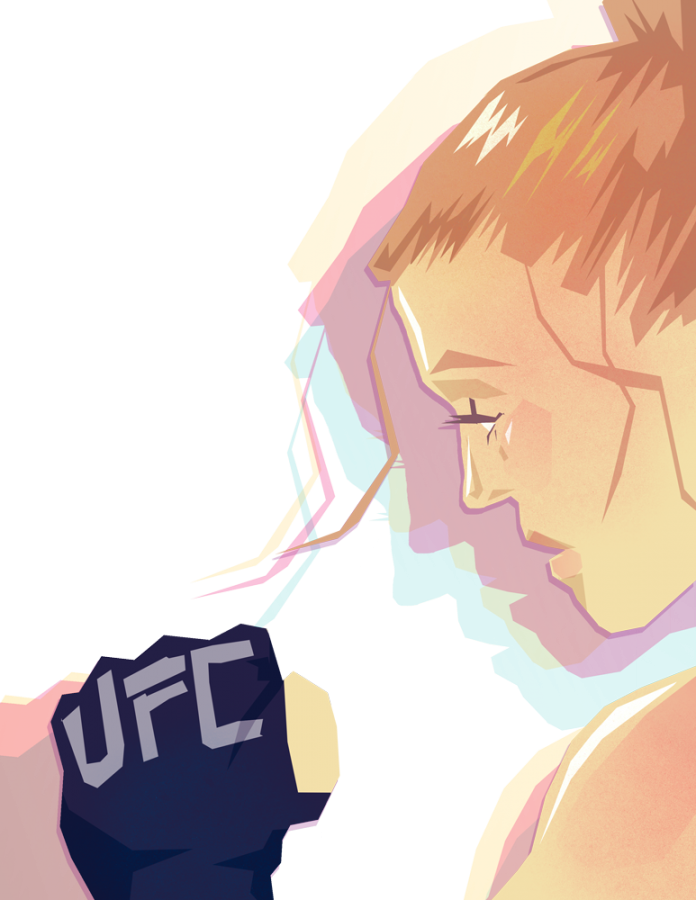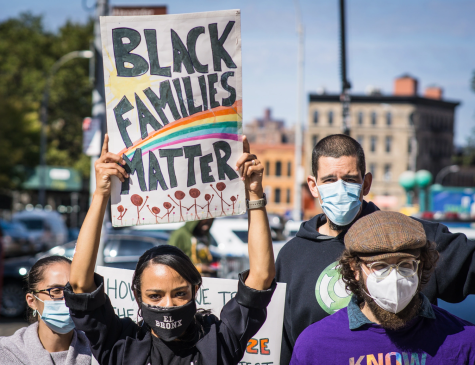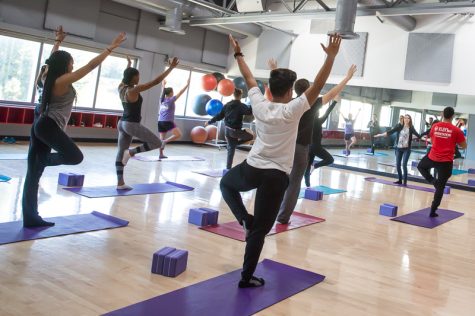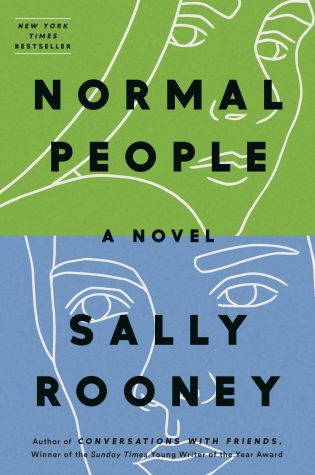Ronda Rousey, still my champion
March 17, 2016
The octagon glowed like a blacklight in the darkened arena as the song “Bad Reputation” by Joan Jett blared through the speakers. A rumble of excitement coursed through the crowd as a fighter wearing a black UFC hoodie branded by the word, “Rowdy,” strode swiftly to the illuminated cage. The Women’s UFC Bantamweight Champion of the World, Ronda “Rowdy” Rousey, was about to fight.
If the octagon was a school, class was in session. The challenger held out her gloves for Rousey to touch with her own, a sign of respect. Wearing an unapologetic scowl, Rousey’s hands remained at her sides. Less than a minute later, the fight was over and “Rowdy” reigned victorious again, thanks to her signature Judo hip-toss and a fight-winning armbar, a joint-lock submission technique in which the legs are placed across the opponent’s chest to hold the upper body in place while the elbow is hyperextended.
Nine out of 12 of her professional fights lasted one minute or less, and eight were won by armbar submission in the first round. For four years, Rousey was recognized worldwide as the face of women’s mixed martial arts and as the UFC Women’s Undisputed Bantamweight Champion of the World. Then, along came Holly Holm.
In November 2015, national boxing champion Holm proved to be the chink in Rousey’s armor when she shattered her perfect 12-0 record with a well-timed high kick to the head that knocked her out and delivered a crippling blow to her identity and caused her to question taking her own life. A revelation of her struggle on national television reminded fans why Rousey is still a champion, both physically and mentally.
In her first talk show appearance since the Holm fight, on Feb. 16, Rousey revealed on the Ellen Degeneres Show that suicide was on her mind following the first loss of her career.
“What am I anymore if I’m not this?” a teary-eyed Rousey told Ellen. “I was literally sitting there and thinking about killing myself and in that exact second I’m like, I’m nothing. What do I do anymore? No one gives a shit about me anymore without this.”
It turns out that win or lose, some people saw Rousey as a champion for her honest admission, while others expressed criticism of Rousey’s display of emotion. Many took to social media to express their support for and critique of Rousey’s actions.
“You have to learn how to lose before you can actually win,” former UFC Heavyweight Champion Brock Lesnar told ESPN in an interview on Feb. 16. “She’s just got to get back on the horse again and figure it out, and she will.”
I can’t imagine that critics have any idea what it is like to be a professional athlete.
Picture this: one day you’re worshipped in the media as one of the most dominant athletes in the world. You have thousands of fans and press opportunities are pouring in. Years of training, dedication and passion have paid off and your name has become synonymous with “champion.” And in less than ten minutes, with a simple head kick, your dreams of retiring undefeated are crushed. Suddenly, the media, the “fans” and the recognition aren’t so kind anymore. It seems that everything you’ve worked for is gone, just like that. Having experienced all of that, Rousey is stronger than most of us could ever imagine.
“You can’t be a fighter and be in ten movies a year,” Lesnar told ESPN, referring to Rousey’s Hollywood crossover into various action movies such as “Entourage,” “Furious Seven” and “The Expendables 3.” Many have argued that the fighter has been spread too thin with other obligations, taking time and focus from her training.
But what Rousey has done with her career is remarkable. Not only has she crossed over into movies, she has also graced countless magazine covers and even authored a novel. In 2015, she took on three title fights in nine months, which is more than some fighters take on in an entire year. Although she is hesitant to adopt the position of a role model, that’s exactly what she is.
She is largely the reason there’s a women’s division in the UFC at all. In the beginning of her professional career, Rousey captured the attention of UFC President Dana White when she stole the Bantamweight Champion title from Miesha Tate in 2012 in Strikeforce, an MMA organization based in San Jose.
White became convinced that women belonged in the UFC and signed Rousey in November 2012 as the very first woman in the UFC. She made history again soon afterward when she was named the first ever UFC Women’s Bantamweight Champion of the World.
In addition, Rousey’s family history with depression, coupled with her strong personality, makes her the perfect person to crack the taboo on suicide that is even more stringent at the professional athletic level.
When Rousey was eight years old, her father took his life, a tragedy that she has talked openly about throughout her professional career. Following her Ellen appearance, Rousey told TMZ Sports that she currently works with Didi Hirsch, a free mental health clinic in Los Angeles to destroy the stigma that surrounds suicide and encourage people to open up and seek help.
“I’m thinking about like, what my actual purpose is, and maybe just winning all the time isn’t what’s best for everyone,” Rousey told Ellen. “Everyone has their moment of picking themselves up off the floor. Maybe I just had to be that example, picking myself off the floor for everyone, and maybe that’s what I’m meant for.”
Rousey may have lost her fight against Holm, but she proved to be stronger than anyone expected when faced with the dismal battle against depression. Her ability to find strength in her darkest moment serves as a shining example to thousands. The moment Rousey lost that fight, she became a stronger champion than ever before.
“I really do believe that I’m still undefeated, because being defeated is a choice,” Rousey said on Ellen. “Everybody has losses in their life, but I choose to always be undefeated.”
















